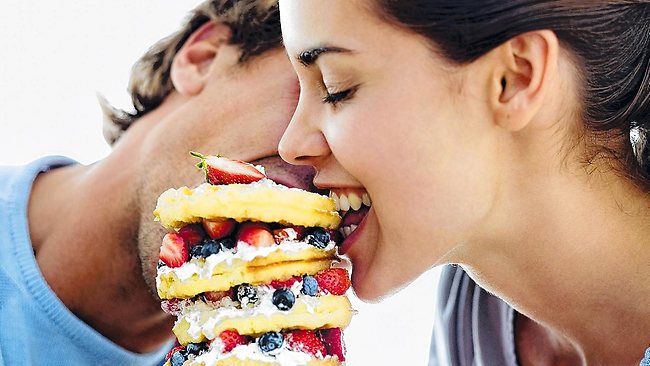Does gender influence our diet?
ARE men and women programmed to want different foods? And why are some foods "masculine" (steak, burgers) and others "feminine" (cupcakes, salads)?

ASK any man what his favourite food is and chances are he'll nominate a juicy steak or a gravy-smothered meat pie.
Put the same question to women and an answer including cupcakes and chocolate would not be out of place.
The question of whether our gender determines what we like to eat has long puzzled scientists and nutritionists. And there must be a reason why the book Real Men Don't Eat Quiche became such a bestseller.
Are men and women programmed to want different foods? Do we have varying body requirements? Why are some foods "masculine" (steak, burgers, chips) and others "feminine" (cupcakes, yoghurt, salads)?
+ MATTER OF TASTE
Kim Terakes, author of The Great Aussie Bloke's Cookbook (Penguin), says: "Guys tend to think they haven't had a meal if they haven't had a big piece of protein, whereas women have a prawn risotto and think that's dinner. For men, that's an entree."
Terakes, like most people, thinks men need to eat more because they are physically bigger than women.
While nutritionists generally recommend a higher calorie intake for men, the amount of daily energy we need to consume depends on a variety of factors such as age, height and level of activity, says Sharon Natoli, director of Food & Nutrition Australia.
This means an active woman needs to eat more than a male couch potato.
What we choose to eat comes down to our upbringing, cultural norms, social inputs and genetics, Natoli says. "It can be that the influence of gender is stronger than we know - there just hasn't been enough research into this area of nutrition."
However, there is a reason why women are more likely than men to reach for that cupcake.
"When you look at tastebuds, men have a lower sensitivity to bitterness, which is why they are more likely to enjoy beer and savoury foods than women. Conversely, women have a greater sensitivity to bitter tastes so they prefer sweet treats," Natoli says.
Studies have also shown that chocolate affects the brains of men and women differently. Eating it decreases activity in women's amygdala, the part of the brain that regulates sexual desire and helps stabilise hormones.
Yet some researchers argue chocolate releases dopamine in women's brains, a substance which normally peaks during sexual activity.
+ IT'S A SOCIAL THING
Professor Lauren Williams, from the University of Newcastle's School of Health Sciences, says socialisation is the main factor that determines what we like to eat.
"Our social inculcation is the dominant factor that affects why we choose the food we do," Williams says.
"Our roles in society are reproduced at the family table. Children watch as their dad gets the bigger steak and mum gets a smaller portion."
In Western societies, including Australia, eating meat has always been linked to strength and masculinity.
"Men disdain fruit and vegetables as being healthy foods women eat because they want to lose weight. Men want to build muscle so they eat meat because that's what meat is - muscle from other animals," Williams says.
Media and advertising have long played a role in this perception of meat as a man's food. Back in the 1970s and 1980s, Meat & Livestock Australia ran a campaign under the slogan "Feed The Man Meat".
Williams believes the campaign's consequences are still being felt today. "The 'feed the man meat' idea is very deeply ingrained in our society," she says.
"All those stereotypes of how we view food are reinforced by the media."
+ GUILT TRIP
For women more than men, eating is complicated - and guilt can play a part.
"Women often question their food choices, so they are more likely to say, 'I should be having the salad but not the fish and chips.' Most men wouldn't think twice about the consequences of what they eat - with the exception of men who are overweight or athletes," says sport and health psychologist Tracey Veivers of Brisbane-based health consultancy Performance Perspectives.
"For the average man, there is less consequential thinking about their food choices. They don't necessarily think about what's on their plate.
"Women are bombarded with so many messages about what we should look like and what it takes to look like that, it's almost impossible not to be aware of some nutritional information," Veivers adds.
"Men aren't as cognisant. They think, 'Meat pie, great'. Women think, 'Oh my God, pastry'. It's a different way of conceptualising your choice."
+ LET THEM EAT CAKE
Calorie-laden sweet treats may offer little in nutrition, so why are even the most conscientious health fanatics still attracted to them?
"If we ate for nutritional reasons, we'd never eat cake but we do it to meet our emotional needs," says Professor Lauren Williams.
"People say they crave something sweet but what they actually eat is something with fat, such as cake, instead of having orange juice or fruit." Why does cake - or fat - prove irresistible?
"It may go back to infancy when we were comforted with breast milk, which has a high fat content. That could be why we tend to associate fat with comfort," says Professor Williams.
Get more from Body and Soul here



